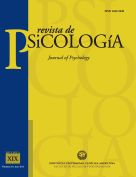United to Help Teachers - Intervention to promote mental health literacy in secondary school teachers: Preliminary results
Keywords:
mental health promotion, mental health literacy, teachers, young people, impact of the interventionAbstract
Several adolescents experience significant mental health problems that interfere with their development, but they often don´t have the necessary knowledge to recognise the symptoms (Trudgen & Lawn, 2011). Teachers therefore play a crucial role in early detection of mental health problems in their students and referral to early intervention support services (Graham, Phelps, Maddison & Fitzgerald, 2011; McGorry, Purcell, Hickie, & Jorm, 2007; VicHealth, 2008). Frequently they are the first to observe the maladaptive behaviours that affect young people’s learning and overall functioning (Meldrum, Venn & Kutcher, 2009; Trudgen et al., 2011; Whitley, Smith & Vaillancourt, 2012). The “United to Help Teachers - Intervention to promote mental health literacy in secondary school teachers” project aims at promoting mental health literacy in secondary school teachers. The intervention is composed by two sessions, 150 minutes each, one-week interval. Sessions follow an interactive methodology, using group dynamics and music and group discussions. The impact of the intervention is conducted through a pretest-posttest design using “Questionnaire UPA Makes the Difference: Perceptions of mental health problems – teachers’ form”. Sixty secondary school teachers participated in this study. The postest showed a significant increase in teachers’ positive perceptions regarding mental health problems (less stigmatized), as well as a significant improvement of teachers’ perceived knowledge regarding mental health issues. These results suggest that increasing teachers’ mental health literacy is a crucial complement of school-based intervention that can permit early detection of mental health problems in young people.Downloads
References
Burns, J. & Rapee, R. (2006). Adolescent mental health literacy. Young people’s knowledge of depression and help seeking. Journal of Adolescence, 29, 225–239. doi:10.1016/j.adolescence. 2005.05.004
Campos, L., Palha, F., Dias, P. & Costa, N. (2012). UPA Faz a Diferença – Acções de sensibilização pró-saúde mental. Relatório final. Retrieved from http://www.encontrarse.pt/Default.aspx?PageId=2&ContentId=2250
Campos, L., Palha, F., Lima, V. S., Dias, P., Duarte, A. & Veiga, E. (2014). Schoolbased interventions to promote mental health literacy in Portugal. In E. Kourkoutas (Ed.), Innovative Practices and Interventions for Children and Adolescents with Psychosocial Difficulties and Disabilities. Newcastle Upon Tyne: Cambridge Scholars Publishing. Manuscript submitted for publication.
Cohall, A., Cohall, R., Dye, B., Dini, S., Vaughan, R. & Coots, S. (2007). Overheard in the halls: What adolescents are saying, and what teachers are hearing, about health issues. Journal of School Health, 77 (7), 344-350. doi: 10.1111/j.1746-1561.2007.00218.x
Graham, A., Phelps, R., Maddison, C. & Fitzgerald, R. (2011). Supporting children’s mental health in schools: teacher views. Teachers and Teaching: theory and practice, 17 (4), 479–496. doi:10.1080/13540602.2011.580525
Jorm, A. (2000). Mental Health Literacy. Public knowledge and beliefs about mental disorders. British Journal of Psychiatry, 177, 396-401. doi: 10.1192/bjp.177.5.396
Kelly, C. M., Jorm, A. F. & Wright, A. (2007). Improving mental health literacy as a strategy to facilitate early intervention for mental disorders. Medical Journal of Australia, 187, S26-S30.
Kobau, R., Dilorio, C., Chapman, D. & Delvecchio, P. (2010). Attitudes about mental illness and its treatment: Validation of a generic scale for public health surveillance of mental illness associated stigma. Community Mental Health Journal, 46, 164-176. doi: 10.1007/s10597-009-9191-x
McGorry, P. D., Purcell, R., Hickie, I. B. & Jorm, A. F. (2007). Investing in youth mental health is a best buy. Medical Journal of Australia, 187 (7), 5–7.
Meldrum, L., Venn, D. & Kutcher, S. (2009). Mental health in schools: How teachers have the power to make a difference. Health & Learning Magazine, 8, 3-5.
Rethink (2008). Combating stigma. Additional resources for trainee teachers. Retrieved from http://www.time-tochange. org.uk/about/what-are-wedoing/end/combating-stigma-dvd
Trudgen, M. & Lawn, S. (2011). What is the threshold of teachers’ recognition and report of concerns about anxiety and depression in students? An exploratory study with teachers of adolescents in regional Australia. Australian Journal of Guidance and Counselling, 21, 126-141. doi: http://dx.doi.org/10.1375/ajgc.21.2.126
VicHealth (2008). Because mental health matters: a new focus for mental health and wellbeing in Victoria. Retrieved from http://mifellowship.org/sites/default/files/Because%20mental%20health%20matters.pdf
Whitley, J., Smith, D. & Vaillancourt, T. (2012). Promoting mental health literacy among educators: critical in school-based prevention and intervention. Canadian Journal of School Psychology, 28 (1), 56-70. doi:10.1177/0829573512468852 World Health Organization (2001). The World health report. Mental health: new understanding, new hope. Retrieved from http://www.who.int/en/
Wyn, J., Cahill, H., Holdsworth, R., Rowling, L. & Carson, S. (2000). MindMatters, a whole-school approach promoting mental health and wellbeing, Australian and New Zealand Journal of Psychiatry, 34, 594-601. doi: 10.1046/j.1440- 1614.2000.00748.x
Downloads
Published
How to Cite
Issue
Section
License
















